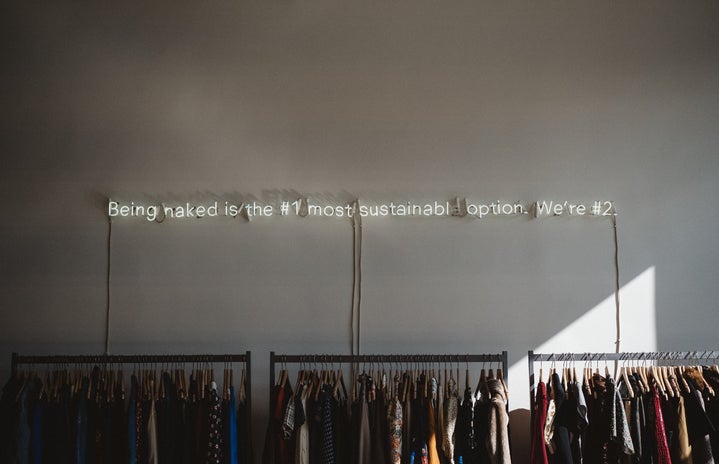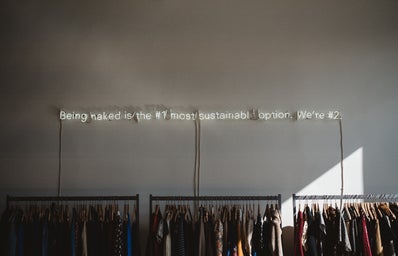It’s no secret that modern society is materialistic and driven by consumerism. In fact, it’s practically etched into our brains that buying the latest trendy objects will make our lives easier and us happier. Another thing we love: convenience. Whether that means we drive to class rather than walk, or we grab fast food instead of cooking, industry has given us so many shortcuts to make life faster and easier. However, we also know that there is a price to our consumerist society, a cost that is quickly and inevitably catching up with us. The irony of it all is that living a sustainable lifestyle is difficult and expensive for the average American. While we can try our best to live sustainably, unless we have the funds and resources, it is not always feasible. Meanwhile, the richest people in America are taking 20-minute trips on their private planes and partnering with fast fashion companies. Below are some sustainable lifestyle changes I would make in my dream world where I have adequate funds and hold influence. I hope I am able to implement at least some of these changes in my future.
- Let’s talk fashion!
You knew this was coming, let’s talk about fast fashion. Fast fashion generates toxic waste in the production process, exploits their workers, and leads to hundreds of thousands of tons of waste in “sacrifice zones” in poor parts of Asia, Africa, and South America. These “sacrifice zones” are where unsold clothes are dumped and eventually burned, emitting massive amounts of synthetic oils and CO2 into their environment. We know fast fashion is harmful and yet we continue to shop from fast fashion brands. Why? Because it’s hard not to. Not only is it cheaper than shopping at sustainable brands but nearly every main fashion chain you can think of contributes to fast fashion. To keep up with competitors, this fast and wasteful style of production has become the norm in the fashion industry. If I were rich, I would do my best to shop only from sustainable brands only and promote these brands. If I had any influence, I would not only try to make others more aware of the harms of fast fashion, but keep companies accountable for the amount of waste they produce.
2. FOOD. I would eat sustainably!
I’ll keep this brief for the sake of length: our food industry is F*CKED. The meat, fish, and produce we purchase at the supermarket are overcome with growth hormones, pesticides, preservatives, etc. Not only is it terrible for our personal health, it is destroying our environment’s health. America’s food system is not sustainable. It exploits minorities, is the number one reason for deforestation in the world, and is the second biggest contributor to CO2 emissions, only after energy production. Because the meat and agriculture industries are largely dominated by a select few corporations that hold enormous influence, there are few sustainable farms left that can afford to compete with these major companies. If I were rich, I, (or my personal chef HAH) would get all my produce at local sustainable farms and would learn how to store foods that are not in season to prevent me from buying from supermarkets. I would only consume meat and dairy products from farms that use ethical and sustainable means of farming.
3. Transportation: I would drive an electric car
Not going to lie, the transportation piece is tough. We have to get places and if I were rich, I probably would not want to take public transit to get around. However, at the very least, I would buy an electric car. Electric vehicles are not perfect, they still require electricity to charge and there are ethical concerns regarding their batteries. However, they emit no carbon pollution, which is one of largest pollutants in our air right now. Electric cars have been proven to produce drastically lower amounts of greenhouse gasses than gasoline-driven cars. In addition, the field of electric vehicles is looking to power them by renewable energy sources in the future, which would further decrease the amount of greenhouse gasses required.
4. Waste elimination: I would compost and recycle
While most people are willing to recycle, lots of cities in America do not offer recycling services or require households to pay to recycle. To make things worse, oftentimes when households do recycle, a majority of it is thrown in with the rest of trash. If I were rich and possessed influence, I would pay for my neighbors’ and my recycling, and ensure it gets taken to a recycling plant and not a landfill. I would also hire someone to set up composting outside of my house and teach me how to do it (composting is not as simple as it sounds). I would then donate the soil made to the local farms I am buying. Oh, and my dog’s sh*t would get thrown into my composting pile as well, and not into landfill trash.
5. Last one- ENERGY SOURCE
I am not an expert on what energy source is cleanest, but what I do know is that what most American households use, electricity via burning fossil fuels, is not sustainable. Again, we use this form of energy due to lower costs and convenience. If I were rich however, I would consult an expert to tell me what renewable energy source is best and find a way to implement it in my house. I would have a home with open windows and roofs, so I wouldn’t have to use electric light sources during daylight. I would also be able to afford sustainable house appliances like an EcoFlush toilet! Fun stuff.
Unfortunately, what sells will always hold priority over what is ethical and sustainable. And while the effects might not be right in front of our faces, I can assure you that it is for someone else, and one day it will be for all of us. And while each person should make commitments to be more sustainable, until the industries that lead our destructive consumerism are held accountable, much of it is out of our hands. We will still buy from brands like Shein and consume unsustainable food, because to do otherwise would take an immense amount of effort and money. While this article may seem like a lot of wishful thinking, these lifestyle changes and more, could and should be implemented by the people who have all the money and resources at their disposal. If you have the opportunity in your future to make sustainable lifestyle changes, I hope you do too.
For the Furman student, please make yourself familiar with the accepted recyclables and if you don’t have a recycling bin – request one! Compost bins are also available through the eco-rep program and free. Turn off your lights, take reasonable showers, and walk to class. It is also always encouraged to buy second-hand or to enjoy the clothes that already make-up your closet as trends are so flighty – buy and wear what is a reflection of you, not TikTok. Especially as college students, it really is difficult to engage in purely sustainable practices, but awareness is a crucial step and to do your best!
Check out these awesome sources:
https://www.epa.gov/greenvehicles/electric-vehicle-myths#Myth1


